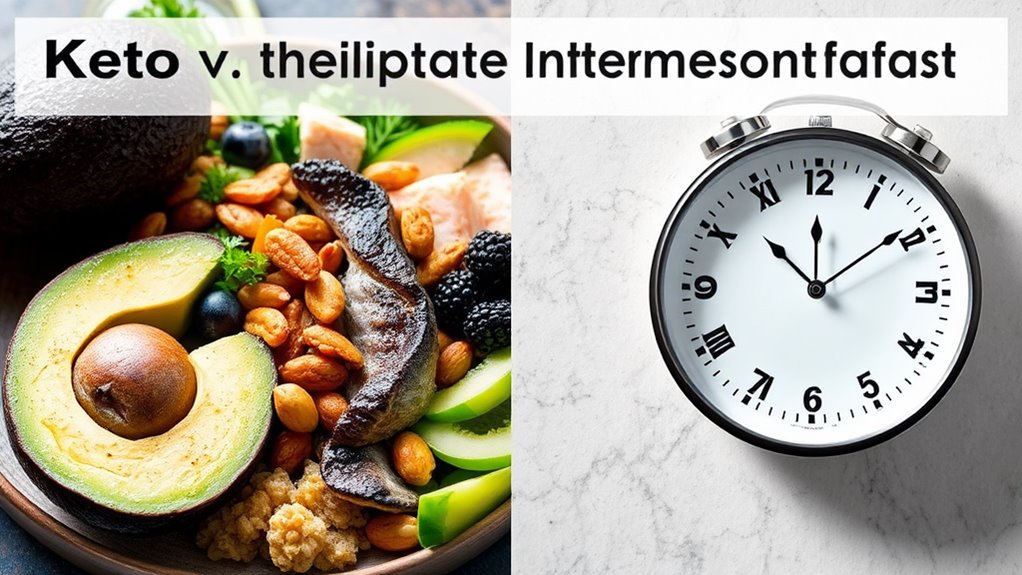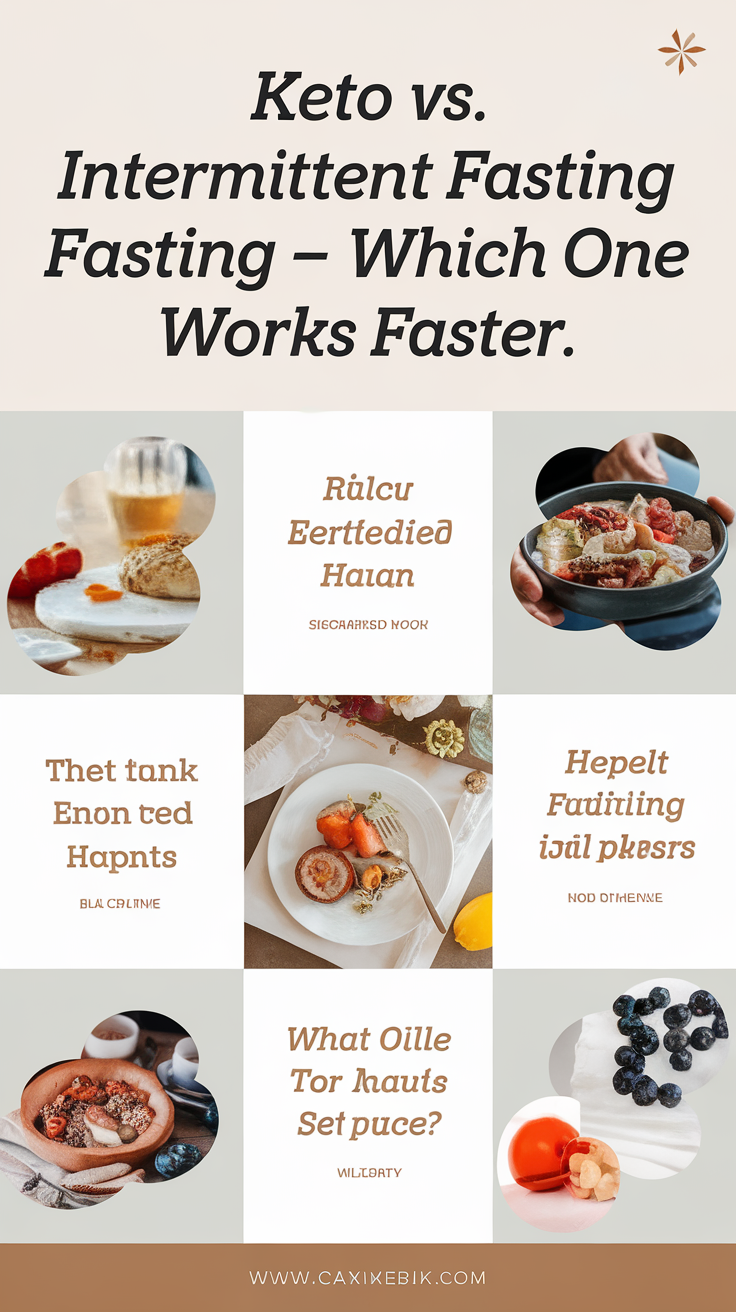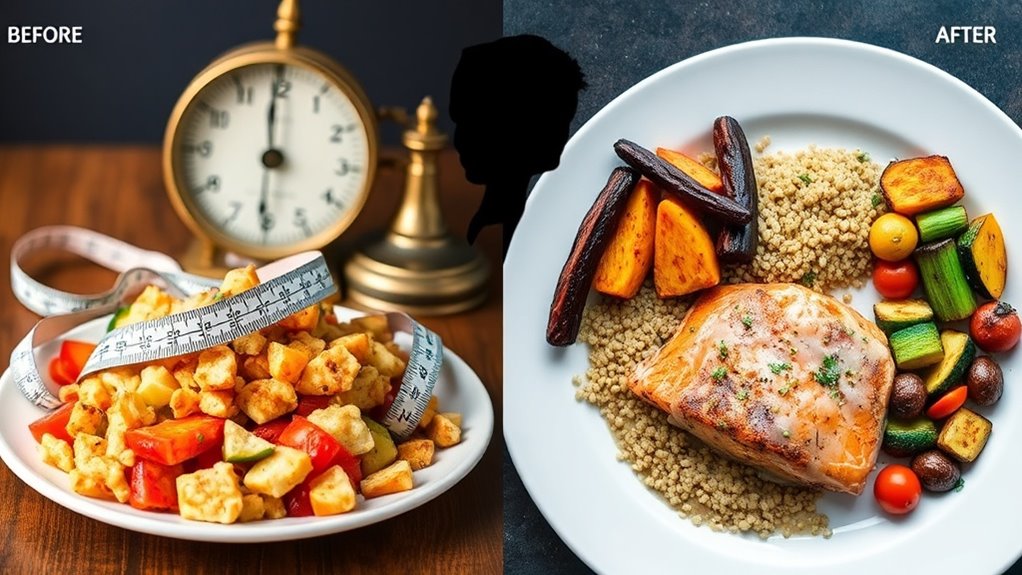Keto vs. Intermittent Fasting – Which One Works Faster.
When it comes to weight loss, the Keto diet can lead to rapid fat loss by shifting your body into ketosis, while Intermittent Fasting focuses on when you eat, promoting calorie reduction and metabolic health. The effectiveness varies based on your lifestyle and preferences. If you enjoy low-carb meals, the Keto might work faster for you. However, finding what aligns with your goals is key. Explore more insights on how these methods can complement each other for better results.
Understanding the Keto Diet and Its Mechanism
Have you ever wondered how the keto diet really works? At its core, the keto diet shifts your body into a state of ketosis. By drastically reducing carbohydrates and increasing healthy fats, you train your body to burn fat for fuel instead of glucose.
This metabolic transition encourages the liver to produce ketones, which become your primary energy source. You’ll need to monitor your macronutrient intake closely, aiming for about 70-75% fats, 20-25% protein, and only 5-10% carbs.
This balance helps suppress hunger and stabilizes energy levels. As you master this diet, you’ll likely experience weight loss, improved mental clarity, and enhanced physical performance.
Embrace the challenge, and you’ll unlock the full potential of keto for your health journey.
Exploring Intermittent Fasting and Its Benefits
While the keto diet focuses on macronutrient ratios to achieve fat-burning ketosis, intermittent fasting (IF) takes a different approach by emphasizing when you eat rather than what you eat.
This method involves cycling between periods of eating and fasting, which can help enhance metabolic flexibility and improve insulin sensitivity. By restricting your eating window, you encourage your body to tap into stored fat for energy, potentially leading to weight loss.
Additionally, IF can promote cellular repair processes and reduce inflammation, optimizing overall health. You might also experience increased mental clarity and heightened focus during fasting periods.
Embracing intermittent fasting could be your pathway to mastering not just your diet, but your body’s natural rhythms as well.
Comparing Effectiveness for Weight Loss
When it comes to weight loss, both the keto diet and intermittent fasting offer unique advantages, but their effectiveness can vary based on individual preferences and lifestyles.
| Method | Effectiveness |
|---|---|
| Keto Diet | Rapid fat loss through ketosis, ideal for those who enjoy low-carb meals. |
| Intermittent Fasting | Flexible eating schedule, promotes calorie reduction, and enhances metabolic health. |
Keto can lead to quick results, particularly in the initial phases, while intermittent fasting may offer sustained weight loss benefits over time. Ultimately, choosing the right method depends on your goals, eating habits, and how well you adapt to dietary changes. Mastery lies in understanding what aligns best with your lifestyle for long-term success.
Factors Influencing Success Rates for Individuals
Choosing the right method for weight loss is just the beginning; personal factors play a significant role in determining success rates. Understanding these factors can empower you to tailor your approach effectively.
Here are four key influences you should consider:
-
Metabolism: Your unique metabolic rate can accelerate or hinder your progress.
-
Lifestyle: Daily routines and commitments shape how easily you can adhere to a plan.
-
Mindset: A positive attitude and resilience are crucial for overcoming obstacles.
-
Support System: Surrounding yourself with encouraging friends or family can strengthen your commitment.
Frequently Asked Questions
Can I Combine Keto and Intermittent Fasting Together?
Yes, you can absolutely combine keto and intermittent fasting. This combination can enhance fat burning and improve metabolic health. Just ensure you’re consuming nutrient-dense foods during your eating window to support your goals effectively.
What Foods Are Allowed on the Keto Diet?
On the keto diet, you’ll focus on high-fat foods like avocados, nuts, and olive oil, while avoiding grains and sugars. Prioritize low-carb vegetables, dairy, and fatty proteins to maintain ketosis effectively.
How Long Should I Fast for Intermittent Fasting?
For intermittent fasting, you should aim for a 16:8 schedule, fasting for 16 hours and eating during an 8-hour window. Adjust based on your lifestyle; consistency will maximize your results and enhance your mastery.
Are There Side Effects of the Keto Diet?
Yes, you might experience side effects on the keto diet, such as fatigue, headaches, and digestive issues. These often occur during the initial adaptation phase as your body shifts from carbs to fats for fuel.
Is Intermittent Fasting Safe for Everyone?
Intermittent fasting can be safe for many, but it’s not for everyone. You should consider your health status, lifestyle, and consult a healthcare professional to ensure it aligns with your individual needs and goals.






